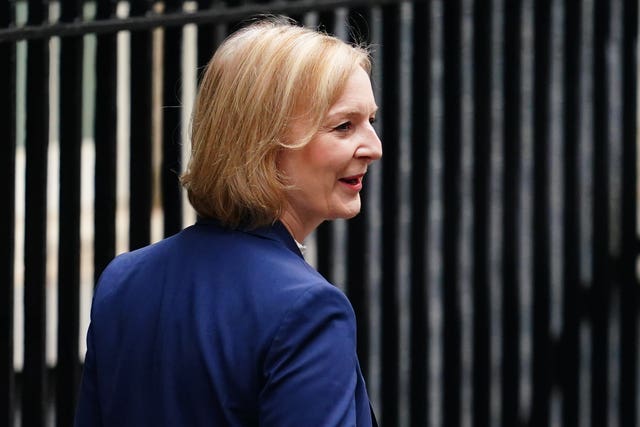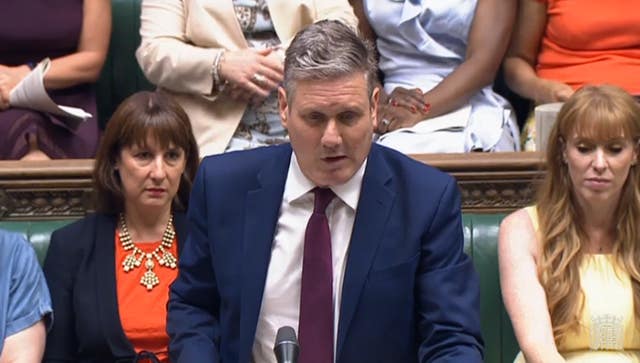New Prime Minister Liz Truss will on Thursday set out a plan to save households and businesses from financial ruin as a result of soaring energy bills.
At her first Prime Minister’s Questions, Ms Truss confirmed her plan, expected to freeze household bills at around £2,500, will be set out in Parliament.
She rejected the idea of using a windfall tax on the bumper profits made by oil and gas giants to fund the package, reported to cost up to £150 billion.
Ms Truss told the Commons: “I will make sure that in our energy plan we will help to support businesses and people with the immediate price crisis, as well as making sure there are long-term supplies available.

“I understand that people across our country are struggling with the cost of living and they are struggling with their energy bills.
“That is why I, as Prime Minister, will take immediate action to help people with the cost of their energy bills and I will be making an announcement to this House on that tomorrow and giving people certainty to make sure that they are able to get through this winter and be able to have the energy supplies and be able to afford it.”
In response to Labour leader Sir Keir Starmer, who has pushed for a levy on the £170 billion of “excess profits” that oil and gas producers are expected to enjoy over the coming years, Ms Truss rejected a windfall tax.
“I am against a windfall tax, I believe it is the wrong thing to be putting companies off investing in the United Kingdom just when we need to be growing the economy,” she said.
Sir Keir said refusing to tax the profits made by oil and gas firms as a result of the high global prices would leave taxpayers footing the cost of the energy freeze for decades.
“The Prime Minister knows she has now choice but to back an energy price freeze, but it won’t be cheap and the real choice, the political choice is who is going to pay,” he said.
“Is she really telling us that she is going to leave this vast excess profits on the table and make working people foot the bill for decades to come?”
The Prime Minister’s official spokesman said the existing windfall tax imposed under Boris Johnson still stands, despite Ms Truss’s opposition to such levies.
And Downing Street indicated that the moratorium on fracking in England could be lifted in Ms Truss’s energy package despite the 2019 Conservative manifesto opposing an end to the ban without science showing it can be done safely.
Ms Truss vowed during her leadership campaign that she would end opposition to shale gas extraction in places where it is backed by local communities.

On Wednesday, the Prime Minister’s press secretary said: “She made clear her position during the campaign but I’m not going to get into what’s in this energy package.”
Ms Truss began Prime Minister’s Questions by striking a conciliatory tone, promising to work with MPs across the House to tackle “the challenges we face”, at a “vital time for our country”.
But her clash with Sir Keir showed clear dividing lines on fiscal policy, with the new Prime Minister determined to scrap planned increases in corporation tax for businesses.
Sir Keir said: “Not only is the Prime Minister refusing to extend the windfall tax, she’s also choosing to hand the water companies polluting our beaches a tax cut. She’s choosing to hand the banks a tax cut.
“Add it all together and companies that are already doing well are getting a £17 billion tax cut while working people pay for the cost-of-living crisis, stroke victims wait an hour for an ambulance and criminals walk the streets with impunity.”
Corporation tax had been due to increase from 19% to 25% in 2023, but Ms Truss said that would deter investors and the UK cannot “tax its way to growth”.
In a sign of the political battles to come, Sir Keir said: “There’s nothing new about the Tory fantasy of trickle-down economics, nothing new about this Tory Prime Minister who nodded through every decision that got us into this mess and now says how terrible it is, and can’t she see there’s nothing new about a Tory Prime Minister who when asked who pays says ‘it’s you, the working people of Britain’?”
Ms Truss told him: “I will take immediate action to make sure we have lower taxes and we grow the economy, and that way I will ensure we have a positive future for our country and we get Britain moving.”
But Ms Truss faced accusations she was dodging scrutiny over the way her energy plans will be presented to Parliament.
She will open a debate on energy costs on Thursday, but unlike a formal ministerial statement this will not result in sustained questioning from MPs about the plan.
Her administration also faced questions after it emerged the Prime Minister’s official spokesman did not attend the first meeting of the new-look Cabinet, limiting the media’s ability to question what was discussed.
Meanwhile, Ms Truss continued making appointments to her Government – former communities secretary Robert Jenrick and Victoria Prentis were made ministers despite supporting Rishi Sunak in the leadership race.
Veteran diplomat Sir Tim Barrow was appointed national security adviser, replacing Sir Stephen Lovegrove who moves to become defence industrial adviser.





Comments: Our rules
We want our comments to be a lively and valuable part of our community - a place where readers can debate and engage with the most important local issues. The ability to comment on our stories is a privilege, not a right, however, and that privilege may be withdrawn if it is abused or misused.
Please report any comments that break our rules.
Read the rules hereLast Updated:
Report this comment Cancel